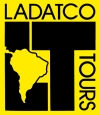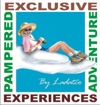
Custom Designing Pampered Adventure since 1966

Destinations
Experiences
 |
L A D A T C
O T O U R S Custom Designing Pampered Adventure since 1966 |
 |
||||||||
| HOME | South America | Falkland Islands | Antarctica | Unique Destinations |
Unique Experiences |
Newsstand | ||||
|
|
FALKLAND ISLANDS New Island
Wildlife Sanctuary |
Below is a basic outline of this Wildlife Sanctuary in the South Atlantic.
Please visit the New Island Land Trust web
for more complete details on who they are,
their conservation efforts.
and how you can support their conservation efforts.ORIGINS:
New Island owes its modern role as a centre for conservation and science to the vision, commitment and generosity of the late Ian Strange MBE.
He spent many years pursuing a dream to transform New Island from a sheep farm into a nature reserve.In 1995 Ian founded the New Island Conservation Trust, and transferred ownership of his (southern) half of the island to the Trust. In 2006 the Trust was able to purchase the northern half of the island from the then owner, Tony Chater, and since that time has owned and managed the whole of New Island.
Falklands Conservation was launched in 1991, and works across the archipelago to conserve the natural environment of the Falkland Islands, through a combination of conservation research, community engagement, and on-the-ground conservation action. In July 2020 Falklands Conservation merged with the New Island Conservation Trust to build on the experiences of both organizations; starting a new chapter for New Island.
WHAT WE DO: CONSERVATION
Conservation is the core of what we do. New Island is the only place in the Falklands which is devoted primarily to wildlife and environmental conservation and which is managed exclusively by a conservation charity.It was not always so. For some 120 years New Island was run as a sheep ranch, much like the rest of the Falkland Islands. For several years in the early part of the last century, it was also the site of a whaling station. We still live with the consequences, which include soil erosion and the presence of non-native invasive flora and fauna (the latter including, cats, rats and rabbits).
However, sheep and cattle were finally removed in the late 1970s, and the shooting of wild birds and the collection of their eggs ceased. Since then the island has undergone a slow recovery, although the consequences of past use are still with us.
As part of this commitment to maintaining New Island as a wildlife reserve, it has also been developed as a centre for scientific research. From late September to late March each year the island becomes an important base for the study of wildlife and the natural environment.
SUPPORTING NEW ISLAND
As an independent, non-profit charity recently merged with Falkland Conservation, New Island relies on the generosity of individuals and foundations to support the conservation work that is carried out on the island. Although New Island does receive income from cruise ship visitors, users of our self-catering accommodation, and the occasional visiting film crew, the island is dependent on donations and public support.Your help is therefore needed to enable us to continue to manage this unique and beautiful place as a wildlife reserve, and to protect its very special wildlife and natural environment.
It can be as simple as spreading the word about the work that we do – tell a friend! It may be that they know someone who knows someone… Maybe you have your own website where you could share our link or help us advertise.
You could also show your support and interest in our work by joining our Facebook group. Hear about what we’re up to, see photos and keep in touch with us and the penguins…
And of course we welcome your donations, large or small. Please refer to the Donate page for details of how to make a donation to our work.